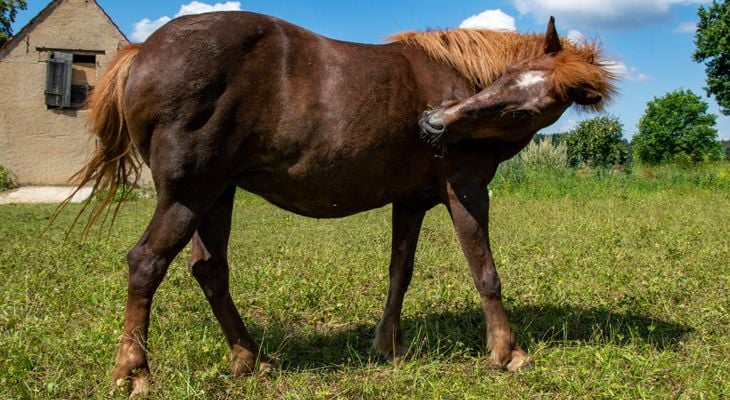
The skin is the largest organ in the body and serves many important functions. In spite of its usefulness, a horse’s skin can also develop redness, itchiness or hives in response to various substances in the environment. These kinds of allergic reactions can be caused by things eaten, inhaled or touched by the horse.
Hives (Urticaria)
Urticaria is a skin condition that is commonly known as hives. They show up as raised, reddened bumps on the skin, often accompanied by itching.
Causes
Hives are most commonly the result of an allergic reaction, such as to insect stings, snake bites, drugs and vaccines, food, soaps or leather conditioners and plants. They can also be caused by exercise, stress, heat, sunlight or excess pressure on the skin.
Diagnosis
Identifying the cause of hives is not always easy. Testing a horse’s reaction to shampoos, soaps and tack cleaners can be helpful in identifying the cause. Horses with ongoing (chronic) hives may need more extensive measures, such as testing for possible allergic reactions to foods, treating for insects and changing the horse’s environment. Skin testing is sometimes used to test for allergies to inhaled substances, such as pollens.
Treatment
The main treatment for hives is to eliminate the underlying cause. Medications may also be given to reduce the allergic reaction, such as hydrocortisone, dexamethasone or hydroxyzine. However, if the allergen is not eliminated, the hives can return once the drugs are stopped.
Skin Allergies
Many allergic reactions can affect a horse’s skin, as well as other parts of the body. As with hives, treatment involves first identifying and then eliminating the underlying cause. Medications may also be used to reduce the allergic reaction. Certain lotions, shampoos and sprays can sometimes relieve symptoms.
Food Allergy
Food allergies are rare in horses, but some cases have been reported. These types of allergies can cause itching of the skin, with or without hives. They can also affect other parts of the body, such as the lungs. Foods that are most commonly suspected include potatoes, wheat, alfalfa, buckwheat, barley, bran and St. John’s wort. Dietary changes may improve symptoms; although care must be taken to ensure that the food(s) was actually the cause of the allergic reaction.
Contact Allergy
Skin allergies caused by something that touches the skin are also rare in horses. These are more severe than just irritation of the skin. Possible allergens include tack equipment, medication applied to the skin, insect repellents or bedding materials. Reddening of the skin, oozing, pain, swelling or itching can occur within a few days of contact. If left untreated, a horse may develop crusting or loss of hair in the area.
Atopy
This type of allergic reaction can affect the skin or respiratory system. This condition may be passed from parent to offspring (inherited). Suspected allergens include dust, fabrics, grasses, molds and trees. Symptoms of atopy include itchiness or reddening of the skin, skin lesions or hives. The area of the skin affected does not need to come in contact with the allergen.
Photoallergy
This type of skin condition is thought to be caused by exposure to sunlight (ultraviolet light) after a horse comes in contact with certain chemicals or plants. The symptoms include reddening, crustiness or swelling on the skin. These signs are more easily noticed on white muzzles and lower limbs.
If you notice hives or other allergy symptoms in your horse, call our office today, so we can help diagnose the root cause of the allergy and treat your horse’s symptoms.


